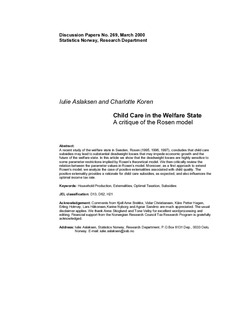Child care in the welfare state : a critique of the Rosen model
| dc.contributor.author | Aslaksen, Iulie | |
| dc.contributor.author | Koren, Charlotte | |
| dc.date.accessioned | 2012-02-01T12:44:49Z | |
| dc.date.available | 2012-02-01T12:44:49Z | |
| dc.date.issued | 2000 | |
| dc.identifier.issn | 1892-753x | |
| dc.identifier.uri | http://hdl.handle.net/11250/180839 | |
| dc.description.abstract | A recent study of the welfare state in Sweden, Rosen (1995, 1996, 1997), concludes that child care subsidies may lead to substantial deadweight losses that may impede economic growth and the future of the welfare state. In this article we show that the deadweight losses are highly sensitive to some parameter restrictions implied by Rosen's theoretical model. We then critically review the relation between the parameter values in Rosen's model. Moreover, as a first approach to extend Rosen's model, we analyze the case of positive externalities associated with child quality. The positive externality provides a rationale for child care subsidies, as expected, and also influences the optimal income tax rate. Keywords: Household Production, Externalities, Optimal Taxation, Subsidies | no_NO |
| dc.language.iso | eng | no_NO |
| dc.publisher | Statistics Norway, Research Department | no_NO |
| dc.relation.ispartofseries | Discussion Papers;No. 269 | |
| dc.subject | Household production | no_NO |
| dc.subject | Child care | no_NO |
| dc.subject | Welfare | no_NO |
| dc.subject | Rosen model | no_NO |
| dc.subject | Taxation | no_NO |
| dc.subject | Subsidies | no_NO |
| dc.subject | JEL classification: D13 | no_NO |
| dc.subject | JEL classification: D62 | no_NO |
| dc.subject | JEL classification: H21 | no_NO |
| dc.title | Child care in the welfare state : a critique of the Rosen model | no_NO |
| dc.type | Working paper | no_NO |
| dc.subject.nsi | VDP::Social science: 200::Economics: 210::Economics: 212 | no_NO |
| dc.source.pagenumber | 24 s. | no_NO |
Tilhørende fil(er)
Denne innførselen finnes i følgende samling(er)
-
Discussion Papers [1002]
